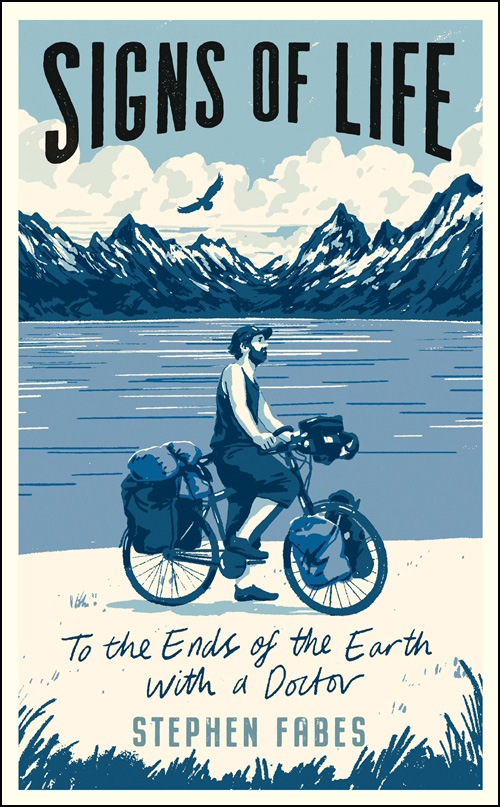In 2010 Stephen Fabes rode away from his career as an emergency doctor in London, on a journey that would see him ride the length of six continents; a cycling circumnavigation which took six years. Signs of Life is his story of a world of challenges — from Tajik camel spiders to camping on a frozen lake in Mongolia, to coaxing another few kilometres out of ‘Ol’ Patchy’ (his faithful inner tube), and of fascinating interactions with the people of seventy-five countries; from hospitable nomads and curious children to vindictive border guards and gangsters. It is also a story of medicine calling Stephen back; he recalls his first pronouncement of death as he examines the frozen body of a monk high in the Himalayas; he is drawn into treating patients at a leprosy clinic; he helps refugees at The Jungle in Calais. All the while, he reflects on how societies treat their most vulnerable and draws comparisons with the lost souls he had treated back home in London; people who he resolves to truly listen to, when he returns to his vocation.
Signs Of Life: To The Ends Of The Earth With A Doctor
I was down at my local library filling some hours in research of my sometime-in-the-future Europe trip when I happened across Stephen Fabes’ new cycle touring memoir Signs of Life: To the Ends of the Earth with a Doctor. What an awesome book and a happy chance I came across it.
Released in 2020 about a journey from 2010–2016, and filled from cover to cover with amusing anecdotes and frank observations of the different cultures and places Fabes found himself, it’s easy to assume this book is like every other travel book ever written. However, I found his self-aware and down-to-earth manner quite refreshing. He doesn’t ‘tackle’ the world like a cocksure adventurer with a sense of ‘conquest’ or other adversarial, heroic language: he slips by, humbly sneaking in and out of peoples’ lives, and manages to stay true to himself to the end.
His intelligence, education and worldview as an English emergency room doctor are plainly influential of his outlook and greatly influence his judgement of the various challenges he witnessed. It was very refreshing to read a well-written, thoughtful summation of an extraordinary journey.
Near the completion of six continents, end to end, and tallying some serious statistics — over 50,000 miles (85,000 kilometres) in 6 years; 75 countries; from ‑39°C in Mongolia to 46°C in Ethiopia; 221 punctures, etc. — he recoils at the idea he has done anything heroic. Quite the opposite: he admonishes himself for spending six years not “participating” in the world.
Throughout the book he displays a dislike, bordering on disdain, for what he terms “social media blowhards”. He visits a personal hero, Heinz Stücke in Hövelhof, Germany in the closing weeks of his journey. Heinz is famous for being the world’s most prolific cycle tourist, spending over fifty years on the road before returning home to meticulously catalogue every moment of those five decades. Stücke’s own journey made him misanthropic, untrusting and seemingly reinforced strong right-wing political views. Fabes, in contrast, comes home even more compassionate and hopeful about humanity than he left.
Fabes judges Stücke to be simply obsessed about clocking up miles and passport stamps, without truly appreciating the beauty and diversity of the world. The reader gets the impression (through Fabes’ disappointed perspective) that Stücke’s odyssey would have been vastly improved if there were no people at all on the way.
I think it was this aspect of the book: Fabes’ struggle to find a deeper meaning to what he was doing, to understanding other people despite his own biases, and to the human condition in general that makes this book worth the read. Yes it’s interesting from a cycle touring perspective but that’s not really what the book is all about. Some reviewers found the random jumps forward in time and skipping of places and events disappointing. For example, Australia warrants only four pages, scant on detail. I too was miffed whilst reading that I couldn’t learn about Stephen’s impressions of my country.
For a bloke on the mission of traversing every continent but Antarctica, effectively skipping over one of them in the narrative entirely seems antithetical. But the last section of the book gives one the answer why: Fabes isn’t interested in listing places and statistics as personal trophies in this book. He has a blog for people interested in those aspects. He keeps the book focused on the people he met and the things he learnt. He had to compress six years into a few hundred pages.
His bike was just a means to a greater end: seeing the world. Understanding the world. Doing it for himself, not to crow about it later. He doesn’t fill pages with lists of gear or recommended brands of bike. Again, he leaves that kind of thing to his blog.
I loved this book for many reasons and highly recommend it. A great read, a great trip well described, a good way to spend your COVID lockdowns and other free time wherever you are.

